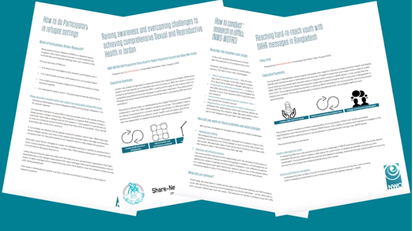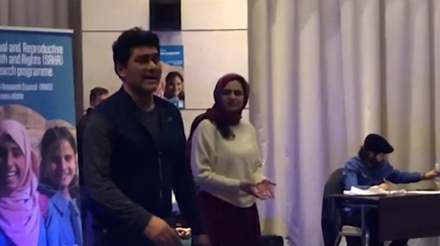News
Vulnerable youth want to shape their Sexual and Reproductive Health and Rights (SRHR)

Young people want to be actively involved in shaping the future of their SRHR. This was the main finding of SRHR research carried out in Bangladesh, Burundi and Jordan.
Since 2019 a team of Sexual and Reproductive Health and Rights (SRHR) specialists from MannionDaniels have been working on a research programme with the Dutch research body NWO-WOTRO Science for Global Development to help strengthen SRHR policies and practices in key populations in Bangladesh, Burundi and Jordan. The aim was to better understand what vulnerable young people in these countries want regarding their SRHR, then use the findings to boost knowledge sharing in the wider SRHR community. This would in turn create a better understanding from decision makers of what the young people in these countries want. Ultimately, translating research findings into updated policies that meet young people’s needs.
The programme supported 12 SRHR research projects across the three countries with a specific focus on vulnerable youth, such as refugees and those living with disabilities.
When the local projects were completed, events to share the research findings with local policy makers were held in each country, researchers also shared and discussed learnings at country level.

Researchers speaking with youth in Burundi
In August, MannionDaniels organised the final conference ‘Listen to us: Voices of youth from Bangladesh, Burundi and Jordan’ took place virtually over two days.
On day one of the conference, researchers and young people involved in the 12 research projects came together to share their findings, reflect on their learnings throughout the process and discuss how these can influence future SRHR research. They discussed commonalities between the projects, including research methodologies and key policy messages.
During day two, the researchers were joined by members of NWO-WOTRO International Advisory Committee, the Dutch Ministry of Foreign Affairs and Share-net International hub members. This session provided researchers with the space to share and discuss their collaborative research and achievements to the wider SRHR audience.

Policy briefs and how-to guides created by researchers
Several interactive sessions between policy makers and researchers took place during the conference, and videos and footage from the research projects were played. The knowledge facilitator team at MannionDaniels produced a final video for the conference which detailed project highlights from each country, key findings, and takeaway messages.
So, what did the research say?
The researchers found that interactive and creative approaches to research are essential to make positive change in youth SRHR. When using innovative approaches to engage young and vulnerable people you give them space to share their views and a platform merges for information to be communicated in local language, drawing in those who may not have previously been heard by policy makers.
For example, in Jordan the National Centre for Culture and Arts (NCCA) play ‘It is not shameful’ was produced by the Interactive Theatre project, showing the negative impact of shame culture on young people’s lives. The project found that talking about SRHR issues through theatre stimulated debate and conversation about preconceptions.

The NCCA play performing 'It is not shameful'.
In Bangladesh the ‘Digital Sisters’ project produced a series of animation videos to share information with youth that was critical to their SRHR. The videos showed how to get help if you are harassed online while bypassing the issues of stigma and shame associated with SRHR. The project found that having a private, safe online space for SRHR information is essential for young people. Parents and teachers need to be included in these communication tools to provide support to their children.

Video still from 'Report Cybercrime in Bangladesh' by the Digital Sisters project'.
This type of creative approach is essential to raise awareness of SRHR issues youth face and further empower youth to make their own decisions regarding their SRHR.
Overall, the knowledge facilitation programme managed by MannionDaniels found the collective messages that:
- Young people want to be actively involved in shaping the future of their SRHR but need to have a safe space to do so
- Youth participation and insight is needed to make sure that the SRHR needs of unheard groups are listened to and met
- Policymakers, implementers, parents, and the wider community need to be involved and supportive and research and results must be shared with them continuously to create effective change.
Find out more about the individual projects and download this end of programme leaflet summarising MannionDaniels activities and outputs as Knowledge Facilitator for the SRHR programme.


